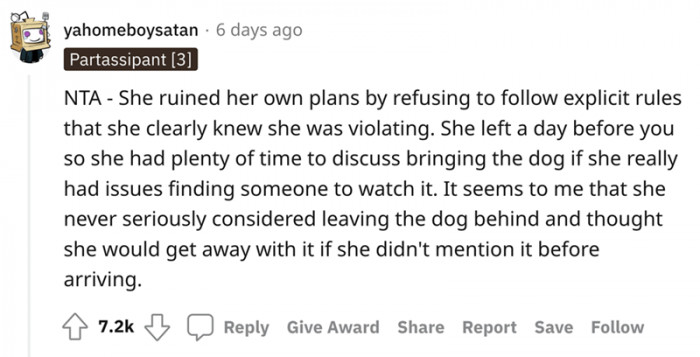Entitled SIL Tries to Sneak in Her Dog into a Place That Doesn’t Allow Pets and Almost Ruins Her Family Vacation, but She Ends Up Stranded in Florida with No Money
Summer. We can't wait to pack our coolers and swimsuits and head off to the nearby beach.
If you don't live near the coast, that can be a little trickier. However, with the rise of vacation rental companies like Airbnb, anyone can choose their preferred beach town and arrange the ideal summer vacation.
There is one catch, though. You see, if an Airbnb states that pooches are not permitted, they usually (always) mean it.
Although we're confident that you already know that, this week we came across a situation on Reddit where someone didn’t. The individual in question is the sister-in-law of the OP, who was informed in advance that the Airbnb they would be staying in would not permit pets.
The in-laws would accompany OP and her husband on their trip to Tampa. It was planned to be a pleasant few days spent unwinding and enjoying the sun on the beach.
So, following a snag at the beginning that kept OP and her husband away for a few hours, they were able to get the keys from the Airbnb owner and arrived to start their holiday. Sadly, SIL was already in the driveway, and she had her dog with her.
Apparently, she planned to sneak it in. OP went straight back to the car, drove away, and got a refund. SIL and her husband were left stranded because, apparently, they remembered to bring the dog but forgot to bring the money with them.
Read this interesting rollercoaster family story here:
OP Booked a Nice Airbnb for Her, Her Husband, His Sister, and Her Husband in Tampa

Airbnb Was Not Dog-Friendly, but SIL Chose to Ignore That. Angry Because of This Blatant Disregard for Other People's Feelings and Money, OP Left and Got a Refund.

It Turns Out That SIL and Her Husband Didn't Have Money to Stay in Tampa Because They Were Planning on Freeloading.

Understanding Entitlement in Context
Entitlement is a psychological construct that can often lead to conflict in social situations, particularly in family dynamics. Research conducted by Dr. John D. Mayer at Harvard University indicates that individuals with high levels of entitlement may have developed these traits as a result of overindulgent parenting styles, where boundaries were not enforced, leading to a skewed sense of self-importance and expectations from others.
This phenomenon is reinforced by social identity theory, which posits that individuals derive part of their self-esteem from their group memberships. In this case, if the individual perceives their family or social group as superior, they may feel justified in demanding special treatment, even when it contradicts established rules.
Understanding these underlying psychological factors can help families navigate challenging interactions with entitled individuals by fostering empathy while also maintaining necessary boundaries.
Psychological research emphasizes the importance of establishing boundaries in family relationships, particularly when dealing with entitlement. A clinical psychologist noted that setting clear expectations and consequences can help mitigate feelings of resentment that may arise from perceived unfairness. Studies show that families who engage in proactive communication about roles and responsibilities often experience greater harmony and less conflict.
One effective strategy is to hold a pre-vacation meeting to discuss rules and expectations openly. This process not only empowers family members to voice their opinions but also fosters a sense of shared responsibility. Behavioral studies highlight that when individuals feel heard and involved in decision-making, they are more likely to respect the agreed-upon rules, leading to a smoother and more enjoyable vacation for everyone.
Redditors Think That OP Did Right

Yes, This SIL Is Full of It.

"At Least Give Them Money for Food?" OP Is Not Obligated to Give Them Any Money

Behavioral psychology suggests that reinforcement plays a significant role in how individuals respond to rules and boundaries. When someone like the entitled SIL successfully sneaks in a pet despite clear restrictions, it may reinforce the belief that they can bend or break rules without consequence. A study published in the Journal of Behavioral Psychology highlights how individuals often repeat behaviors that yield positive outcomes, such as getting away with rule-breaking.
To mitigate these behaviors, families can implement structured consequences for non-compliance and communicate these clearly in advance. Consistency is key; when individuals face predictable consequences for their actions, it can lead to a reassessment of their behavior and ultimately foster greater respect for boundaries.
Yup, That Was the Plan. Also, Not Paying for Anything...

Apparently, You Can Live Without Food, but Not Without Gas...

SIL Simply Thought She Could Get Away with It.

The Impact of Stress on Family Dynamics
Family vacations are meant to be bonding experiences, but they can also amplify existing tensions, especially when conflicts arise from entitlement issues. According to research from the University of Michigan, stress can significantly impact family interactions, leading to increased misunderstandings and emotional dysregulation.
The study suggests that vacations, while often portrayed as relaxing, can serve as high-stress environments due to the pressure to create enjoyable experiences. This pressure can exacerbate conflicts and lead to dramatic confrontations, as seen in the case of the SIL. Therefore, it is crucial for families to engage in stress-reduction techniques, such as mindfulness or open communication strategies, to navigate these potentially volatile situations.
Encouraging families to express their feelings and expectations before a trip can lead to clearer communication and reduce the likelihood of entitlement conflicts arising during the vacation.
People Who Own Dogs Simply Don't Rent Properties That Don't Allow Dogs—It Is That Simple. Of Course, They Are Also Paying for Them. We Guess It Is Much Easier to Lie When Someone Else Is in Danger of Losing Their Deposit.

OP was rightly angry and, rather than making a scene, immediately got back into the car to drive away. The reactions that followed are an incredible mix of tragedy and parody.
Her SIL was saying that they didn't have money for food and practically begged for it. Why would anyone go on vacation and not bring money?
Well, judging by the level of entitlement she is displaying (refusing to accept the fact that there are places that don't allow dogs, accepting an expensive holiday, sneaking in the dog), she was probably planning to freeload the whole time.
And you thought your family was awful?
Psychological Analysis
The behavior of the sister-in-law reflects a classic case of entitlement, where she feels justified in breaking the rules because she believes her needs should take precedence. This kind of mindset often stems from a lack of boundaries in upbringing, leading individuals to expect special treatment without considering the consequences for others. When family dynamics are involved, these situations can escalate quickly, highlighting the need for clear communication and established expectations to prevent misunderstandings and resentment.
Analysis generated by AI
Professional Assessment & Guidance
The intersection of entitlement and family dynamics can create a complex web of challenges during shared experiences, such as vacations. Research highlights that understanding and addressing these psychological factors is crucial for fostering healthier interactions. As studies demonstrate, clear communication and established boundaries can significantly improve family cohesion, allowing for enjoyable experiences that honor both individual needs and communal expectations.
By engaging in proactive discussions and reinforcing accountability, families can navigate the often tricky waters of entitlement and expectations, leading to more fulfilling and stress-free interactions. Ultimately, the aim is to create a shared environment where respect and understanding prevail, enhancing the overall family experience.



